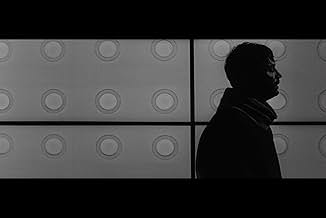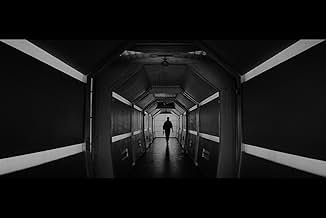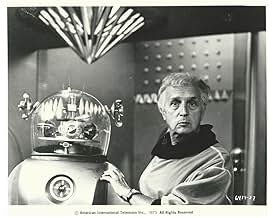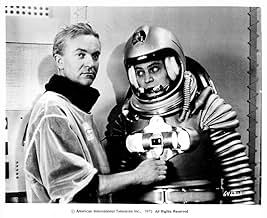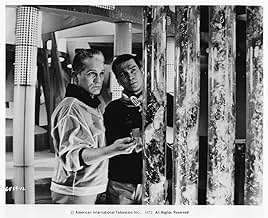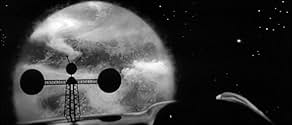CALIFICACIÓN DE IMDb
6.9/10
3.2 k
TU CALIFICACIÓN
Es el año 2163, y una nave espacial Ikarie emprende un largo viaje a través del Universo para buscar vida en los planetas de Alfa Centauri.Es el año 2163, y una nave espacial Ikarie emprende un largo viaje a través del Universo para buscar vida en los planetas de Alfa Centauri.Es el año 2163, y una nave espacial Ikarie emprende un largo viaje a través del Universo para buscar vida en los planetas de Alfa Centauri.
- Dirección
- Guionistas
- Elenco
- Premios
- 1 premio ganado en total
Opiniones destacadas
Still relatively unfamiliar to western audiences, Ikarie XB 1 is an example of east European science fiction cinema on a fairly ambitious scale deserving of wider appreciation. Usually it's been only seen in a butchered edition created Stateside - duly shorn of a plot strand, dubbed with a different ending, with a dumb title.
With the benefit of hindsight, a lot of the original seems familiar. With its clean interior ship design, crew neck uniforms all round, glide doors, shiny deck flooring as well as a 15-year mission to seek out new life, Ikarie may have given later pause for thought for a certain Gene Roddenberry. Genre fans will also note that, during the first big set piece, the crew are startled by an unexpected alarm and deviate from their mission to investigate a derelict spacecraft - events which end with a nuclear detonation in space. Add to this the changes wrought by the American bastardisation of Voyage To The End Of The Universe, that included an ending which anticipates Planet of the Apes, as well as its possible inspiration to Kubrick when planning 2001, and Ikarie certainly offers much of interest. Not to mention its own borrowings eg Ikarie's robot Patrick, inspired by Forbidden Planet (1956)
Polák's was also responsible for an intriguing Nazi time travelling movie, with a small cult on its own account, Tomorrow I'll Wake Up And Scald Myself With Tea, made in the late 1970s. Less idiosyncratic than this, one imagines, Ikarie is much more serious in tone, set mostly aboard a roomy spacecraft, crewed by 40, dispatched to discover if there is any life on Alpha Centauri. A feeling of worthwhile isolation permeates this journey, with none of the trivial, trials and stresses one expects from space dramas made closer to home at this time, where mad scientists lurk, robots lumber threateningly or spacewomen defer to their mates. Missing too is the pseudo technical claptrap which lumbers much American SF, then or now. Ikarie's hardware exists mainly in the background, without need of explanation. The film expects us to take its conspicuous 22nd century advances just as seen, being concerned more with sociology than technology.
Ikarie features a harmonious society in miniature, shown in a series of interactions aboard, even down to the calm acceptance of on board pregnancy - an adult theme incidentally completely excised in the American version. In such an hospitable environment, even the mad can be talked round without violence, as in the case of Michael (Otto Lackovic) who, affected by radiation and in a disastrous manoeuvre, wants to turn the ship back to Earth. That the only real threat the crew face is an external one is significant, and also primes the dramatic moment that begins the narrative. A flash-forward to when (infected by the same source, as we learn later), one of the crew is wandering, bewildered and aggressive, through the ship. "Earth is gone," he says. "Earth never existed." But he's not beyond help from his peers. Here the deluded or mad in space are not assumed lost, such as we might see in such recent American films as Event Horizon, but taken back and with promise of cure at that.
Critics have contrasted these shipboard mores to the signs of capitalist degeneracy confronting those who board the 'Tornado', the derelict space station from 1987 unexpectedly encountered en route. Here, amidst the dark clutter of its interior, are found signs of gambling and money, coded elements of capitalist speculation, just as fatal as the death gas and nuclear warheads also there. For those who explore it, the Tornado reflects a place thought left behind, both geographically and politically. "We have discovered the 20th century," says one dismayed crewman. The determined self destruction encountered by those who board the derelict recalls one of TV's original Star Trek shows, and those found died as result of a selfish fight for survival. The signs of a corrupt political system fall exposed with as much horror as does (in a notable moment) the skin off the Tornado captain's face.
This, and then the debilitating effects of rays that emanate from a hitherto unknown black star are the two principal threats facing the crew. How they finally overcome this last hurdle is part of the end of the quest. Without giving too much away, it is sufficient to say that the close of the film, the ship's long anticipated arrival at Alpha Centauri's 'white planet', brings a sequence both uplifting and brief, carrying over the theme of mutually beneficial cooperation. But viewers today may find less interest in the ending than the scenes that have preceded it. It's the Ikarie crew's social or dutiful pairings, even to the point of bringing each other flowers, or taking showers together, which lay at the heart of the film, rather than any encounter of a new civilisation and the socialist message entailed. Whilst in basic narrative terms the 'white planet' brings closure, our attentions have for long been focused elsewhere, in scenes such as the notable dance sequence. Through the hypnotic rhythms of Zdenek Liska's striking score, the astronauts take part in something akin to a weird 22nd century disco, their slow somnambulistic movements reassuring while also slightly disturbing. Reassuring, as we can see the crew reacting together as one social unit, even after the inevitable trials of months in space; disturbing because it is all so emotionless and controlled. Such ambiguous group occasions beg questions we really want answered. Are they really happy? Or does the Earth we thought we recognised in them no longer exist?
The Czech originated disc I have seen offers a splendid widescreen transfer of the movie with English subtitles. Most of the extras are unfortunately not subtitled, but there's a chance to see some sample scenes from the American International version, to give an idea of how the original was changed as well as a stills gallery.
With the benefit of hindsight, a lot of the original seems familiar. With its clean interior ship design, crew neck uniforms all round, glide doors, shiny deck flooring as well as a 15-year mission to seek out new life, Ikarie may have given later pause for thought for a certain Gene Roddenberry. Genre fans will also note that, during the first big set piece, the crew are startled by an unexpected alarm and deviate from their mission to investigate a derelict spacecraft - events which end with a nuclear detonation in space. Add to this the changes wrought by the American bastardisation of Voyage To The End Of The Universe, that included an ending which anticipates Planet of the Apes, as well as its possible inspiration to Kubrick when planning 2001, and Ikarie certainly offers much of interest. Not to mention its own borrowings eg Ikarie's robot Patrick, inspired by Forbidden Planet (1956)
Polák's was also responsible for an intriguing Nazi time travelling movie, with a small cult on its own account, Tomorrow I'll Wake Up And Scald Myself With Tea, made in the late 1970s. Less idiosyncratic than this, one imagines, Ikarie is much more serious in tone, set mostly aboard a roomy spacecraft, crewed by 40, dispatched to discover if there is any life on Alpha Centauri. A feeling of worthwhile isolation permeates this journey, with none of the trivial, trials and stresses one expects from space dramas made closer to home at this time, where mad scientists lurk, robots lumber threateningly or spacewomen defer to their mates. Missing too is the pseudo technical claptrap which lumbers much American SF, then or now. Ikarie's hardware exists mainly in the background, without need of explanation. The film expects us to take its conspicuous 22nd century advances just as seen, being concerned more with sociology than technology.
Ikarie features a harmonious society in miniature, shown in a series of interactions aboard, even down to the calm acceptance of on board pregnancy - an adult theme incidentally completely excised in the American version. In such an hospitable environment, even the mad can be talked round without violence, as in the case of Michael (Otto Lackovic) who, affected by radiation and in a disastrous manoeuvre, wants to turn the ship back to Earth. That the only real threat the crew face is an external one is significant, and also primes the dramatic moment that begins the narrative. A flash-forward to when (infected by the same source, as we learn later), one of the crew is wandering, bewildered and aggressive, through the ship. "Earth is gone," he says. "Earth never existed." But he's not beyond help from his peers. Here the deluded or mad in space are not assumed lost, such as we might see in such recent American films as Event Horizon, but taken back and with promise of cure at that.
Critics have contrasted these shipboard mores to the signs of capitalist degeneracy confronting those who board the 'Tornado', the derelict space station from 1987 unexpectedly encountered en route. Here, amidst the dark clutter of its interior, are found signs of gambling and money, coded elements of capitalist speculation, just as fatal as the death gas and nuclear warheads also there. For those who explore it, the Tornado reflects a place thought left behind, both geographically and politically. "We have discovered the 20th century," says one dismayed crewman. The determined self destruction encountered by those who board the derelict recalls one of TV's original Star Trek shows, and those found died as result of a selfish fight for survival. The signs of a corrupt political system fall exposed with as much horror as does (in a notable moment) the skin off the Tornado captain's face.
This, and then the debilitating effects of rays that emanate from a hitherto unknown black star are the two principal threats facing the crew. How they finally overcome this last hurdle is part of the end of the quest. Without giving too much away, it is sufficient to say that the close of the film, the ship's long anticipated arrival at Alpha Centauri's 'white planet', brings a sequence both uplifting and brief, carrying over the theme of mutually beneficial cooperation. But viewers today may find less interest in the ending than the scenes that have preceded it. It's the Ikarie crew's social or dutiful pairings, even to the point of bringing each other flowers, or taking showers together, which lay at the heart of the film, rather than any encounter of a new civilisation and the socialist message entailed. Whilst in basic narrative terms the 'white planet' brings closure, our attentions have for long been focused elsewhere, in scenes such as the notable dance sequence. Through the hypnotic rhythms of Zdenek Liska's striking score, the astronauts take part in something akin to a weird 22nd century disco, their slow somnambulistic movements reassuring while also slightly disturbing. Reassuring, as we can see the crew reacting together as one social unit, even after the inevitable trials of months in space; disturbing because it is all so emotionless and controlled. Such ambiguous group occasions beg questions we really want answered. Are they really happy? Or does the Earth we thought we recognised in them no longer exist?
The Czech originated disc I have seen offers a splendid widescreen transfer of the movie with English subtitles. Most of the extras are unfortunately not subtitled, but there's a chance to see some sample scenes from the American International version, to give an idea of how the original was changed as well as a stills gallery.
I just saw a gorgeous, widescreen, subtitled print of "Ikarie XB 1", also known as "Voyage To The End of the Universe", at Boston's Museum of Fine Arts. The print, restored by the Czech studio that originally released it, is in black and white, and was obviously shot that way. Its complete running time is listed in the program notes as 84 minutes, though it may have been a few minutes longer. (I should have checked my watch). Like several others who've commented on this, I first saw this movie as a kid when AIP released a dubbed version in the 60s. Its definitely not a kiddie movie, and is still quite impressive for its effects and production design, as well as its intelligent story.
This is an intriguing Czech science fiction film from the early 60's. It's pretty much unknown in the U.S (American - International Pictures dubbed it into English and released it as "Voyage to the End of the Universe" in 1964; it's been seen here only rarely since then).
The movie depicts a group of space travelers on a seemingly endless journey to a new planet. They encounter many traps and dangers along the way (including a derelict spacecraft and a mysterious nebula) but the greatest conflict seems to be psychological: namely, the titanic ambition of a 15-year, trans-galactic voyage pitted against the fragility of the human mind and the relative insignificance of human lives.
The interior sets are lavish -- certainly on a par with "Forbidden Planet" and perhaps even "2001". The level of detail in the spaceship interiors is admirable, and the same can be said for the smartly designed spacesuits.
"Ikarie XB 1" stumbles badly, though, when it comes to the exterior effects work. The spacecraft models are too small to provide much detail, and seem to be propelled through space by dark-colored string. As a result the transitions between interior and exterior shots are somewhat jarring.
All the same, this movie is a very interesting example of mid-century science fiction. It deserves a much wider audience, and it is to be hoped that a restored, subtitled print will one day make the rounds in American art houses. Cross your fingers.
The movie depicts a group of space travelers on a seemingly endless journey to a new planet. They encounter many traps and dangers along the way (including a derelict spacecraft and a mysterious nebula) but the greatest conflict seems to be psychological: namely, the titanic ambition of a 15-year, trans-galactic voyage pitted against the fragility of the human mind and the relative insignificance of human lives.
The interior sets are lavish -- certainly on a par with "Forbidden Planet" and perhaps even "2001". The level of detail in the spaceship interiors is admirable, and the same can be said for the smartly designed spacesuits.
"Ikarie XB 1" stumbles badly, though, when it comes to the exterior effects work. The spacecraft models are too small to provide much detail, and seem to be propelled through space by dark-colored string. As a result the transitions between interior and exterior shots are somewhat jarring.
All the same, this movie is a very interesting example of mid-century science fiction. It deserves a much wider audience, and it is to be hoped that a restored, subtitled print will one day make the rounds in American art houses. Cross your fingers.
Ikarie XB1 is the first Czech SF movie. It was released in black and white only. The story relies to some extent on one of Stanislav Lem's books. The movie is still appreciated not only among science fiction fans in Czechia, but mainly because of its high ambitions. The movie not only shows a trip to proxima centauri, but it also tried to predict future music and dance.
Due to the time it was created (early 60ies) there are some ideological compromises to the communism and cold war.
Due to the time it was created (early 60ies) there are some ideological compromises to the communism and cold war.
Written by the same man who wrote Solaris, rather than a science fantasy, space opera, or race movie like many other scifi films of that era (many of which are just as excellent in their own way - see The Sky Calls, Planeta Bur, or Forbidden Planet, for example), Ikarie XB1 (aka Journey to the End of the Universe) is a serious-minded science fiction drama, with element of mystery and suspense.
My rating of 9 out of 10 Stars might be a little exuberant, but that was my reaction to the film. The sets are sumptuous, almost art deco, the black and white cinematography crisp and beautiful to look at, and the acting always competent or better. The score is largely electronic, with some distorted electric guitar, and no orchestral elements.
Ikarie XB1 is so different from a lot of other science fiction cinema being produced at the time that I found it to be a captivating surprise.
My rating of 9 out of 10 Stars might be a little exuberant, but that was my reaction to the film. The sets are sumptuous, almost art deco, the black and white cinematography crisp and beautiful to look at, and the acting always competent or better. The score is largely electronic, with some distorted electric guitar, and no orchestral elements.
Ikarie XB1 is so different from a lot of other science fiction cinema being produced at the time that I found it to be a captivating surprise.
¿Sabías que…?
- TriviaThe music played on piano after the derelict ship explodes is "Part One: Introduction" from "King David", aka "Le Roi David," composed by Arthur Honegger.
- Versiones alternativasSPOILER: For the American release, titled "Voyage to the End of the Universe," American International Pictures cut the film up, changing a number of things:
- Approximately 26 minutes of footage were removed (including a sequence in a man-made flying saucer carrying dead capitalists, nerve gas and an atomic bomb).
- The story was changed substantially, the ship's flight direction reversed (making it an alien ship traveling to Earth), and the Statue of Liberty pasted into the final shot.
- The cast and staff's names in the credits were altered significantly to look like English.
Selecciones populares
Inicia sesión para calificar y agrega a la lista de videos para obtener recomendaciones personalizadas
- How long is Voyage to the End of the Universe?Con tecnología de Alexa
Detalles
Taquilla
- Total a nivel mundial
- USD 2,130
- Tiempo de ejecución1 hora 26 minutos
- Color
- Mezcla de sonido
- Relación de aspecto
- 2.35 : 1
Contribuir a esta página
Sugiere una edición o agrega el contenido que falta

Principales brechas de datos
By what name was Viaje al fin del universo (1963) officially released in India in English?
Responda

